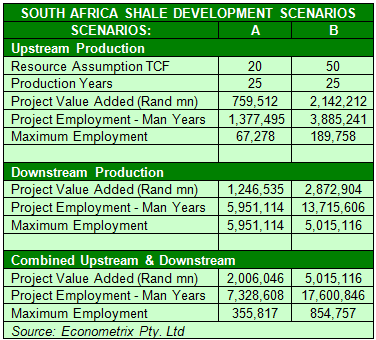Re:Karoo - Oil majors wake up to South Africa's shale potential
in response to
by
posted on
Oct 10, 2013 12:28AM

Developing large acreage positions of unconventional and conventional oil and gas resources


Global companies are turning their attention to South Africa's shale gas opportunities.
On September 30, Canadian Natural Resources Limited said it will partner with France's Total S.A. to explore for natural gas in South Africa.
CNRL sold a 50% working interest and the right for Total to operate in an area of 19,000 square kilometers in the Outeniqua Basin, approximately 175 kilometers off the southern coast of South Africa.
"The first exploration well is targeted to be drilled in 2014. In the event of a successful multi-well exploration program to define the prospect and subsequent commercial development, additional consideration will be received," the company said in a statement.
Total and CNRL are just the latest companies attracted by South Africa's deep-water offshore resources as well onshore plays like the Karoo basin.
Other major companies in exploration phase include Royal Dutch Shell Plc., a joint venture between Falcon Oil & Gas and Chevron Corp., a joint-venture between South Africa's Sasol, Chesapeake Energy Inc. and Norway's Statoil SA. Other companies looking to strike natural gas include Australia's Sunset Energy Ltd. and Anglo Coal of South Africa.
SIGNIFICANT GAS RESERVES South Africa has the eight largest shale gas reserves in the world at 390 trillion cubic feet, according to recent estimates by the US Department of Energy. While the department reduced the country's shale reserves from an earlier estimate of 485 trillion cubic feet, oil companies have been buying stakes in the country's offshore opportunities after the government lifted a moratorium on drilling last year. "In South Africa, the prospective area for the three shale formations in the Karoo Basin was reduced by 15% from 70,800 square miles to 60,180 square miles," the energy department said. "This reduction in the prospective area was largely responsible for the lower South African shale gas resource estimate shown in this report. The Whitehill Shale's recovery rate and resource estimate were also reduced because of the geologic complexity caused by igneous intrusions into that formation." Shell is keen to extract gas from about 90,000 square kilometers, while Falcon Oil & Gas has received a permit to explore 30,000 square kilometers for gas, an area one and a half times the size of the Kruger National Park. Meanwhile, Sunset Energy has a slightly larger area at 35,000 square kilometers, north-east of the Karoo Basin; and the Cranmere project in the Eastern Cape Province north of Port Elizabeth. Sunset estimates the area has recoverable reserves of up to six million barrels of oil. In addition, a consortium made up of Sasol, American Chesapeake Energy and Statoil ASA is looking to explore an area similar in size to Shell's - about 88,000 square kilometers, which includes a large portion of KwaZulu-Natal province and most of the Free State, according to Johannesburg-based Econometrix Pty Ltd. NEED FOR ENERGY
As Africa's largest economy and a net natural gas importer, South Africa is especially attractive to energy developers. Another key incentive for companies is the country's developed mining and manufacturing industries, which could also benefit immensely with the availability of cheap, abundant and clean natural gas.
"South Africa is a net natural gas importer, primarily from neighboring Mozambique and Namibia," said the energy department. "As such, South Africa has given priority to exploration for domestic gas and oil. Shale exploration is initiated via a Technical Cooperation Permit (TCP), which may lead to an Exploration Permit (EP) and eventually to a production contract. The country has a corporation tax of 28% and royalty of 7%, terms that are favorable for gas and oil development."
The move will also allow South Africa to move away from carbon-intensive coal. Electricity production by utility company Eskom is derived from coal resources, which accounts for 81% of generation capacity.
A report by Econometrix estimated that development of shale gas in the Karoo region could help raise the country's growth rate by 3% in a worse-case scenario and as much as 7% in a high-growth case.
The report forecast that, if fully-developed, shale gas could generate sales of ZAR 9.52 trillion (USD 952 billion) over 25 years. In addition, it could create as much as 854,757 jobs, generating ZAR 1.937 trillion (USD 192 billion) per year.
Development of the project would contribute ZAR 2.223 trillion (USD 222 billion) in government revenue -- equivalent to 23% of turnover, or 44% of value added by the project.
A 50 trillion cubic feet resource produces a lifetime value-added contribution equivalent to 239% of 2010's SA GDP or 69% of the value of the projected GDP in 2035.

REDUCING ENERGY POVERTY
The availability of shale gas would also ripple across other sectors and rid South Africa of "energy poverty" which has been identified as a key weakness hurting the country's economy.
"Less measureable beneficial effects would include the impact that large gas resources might make on the energy poverty, which South Africa shares with other African nations, the possibilities of creating employment across the corporate size spectrum, ranging from international energy companies to small and micro enterprises in South Africa," Econometrix said, adding that the resource could help South Africa expand its energy products base.
While analysts are painting a positive picture - success is far from certain. While companies have drilled successfully for shale resources in North America, they have been less successful in other promising plays such as Poland and China, citing geological challenges, lack of equipment, infrastructure and labor.
Environmental concerns are also crucial in assessing the feasibility of the shale gas development, but South Africa's chronic use of dirtier coal shows that it is a venture worth pursuing to boost the faltering economy.
© alifarabia.com 2013